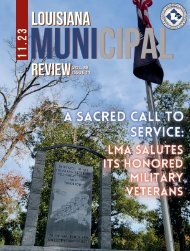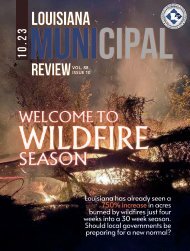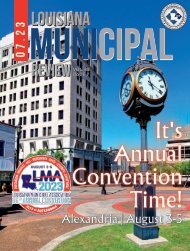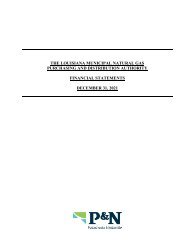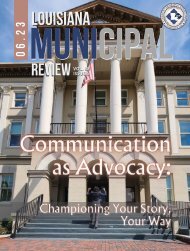GOHSEP Elected_Officials_Manual_2015
You also want an ePaper? Increase the reach of your titles
YUMPU automatically turns print PDFs into web optimized ePapers that Google loves.
<strong>GOHSEP</strong> also offers numerous training opportunities<br />
through a variety of training providers. The following<br />
national training opportunities can be applied for<br />
through <strong>GOHSEP</strong>.<br />
Homeland Security Training<br />
• National Training and Education Division<br />
(NTED) serves the Nation’s first responder<br />
community, offering more than 150 courses<br />
to help build critical skills that responders need<br />
to function effectively in mass consequence<br />
events. NTED primarily serves State, local<br />
and Tribal entities in 10 professional<br />
disciplines, and has expanded to serve private<br />
sector and citizens in recognition of their<br />
significant role in domestic preparedness.<br />
For more information on NTED, visit<br />
firstrespondertraining.gov.<br />
• National Domestic Preparedness Consortium<br />
(NDPC) is a professional alliance sponsored<br />
through the U.S. Department of Homeland<br />
Security (DHS)/FEMA National Preparedness<br />
Directorate. These organizations have<br />
distinguished themselves nationally as experts<br />
in chemicals, explosives, radiological/nuclear<br />
devices, bioterrorism, counter-terrorism,<br />
agroterrorism and emergency management<br />
systems. NDPC reflects the missions of all<br />
these organizations with its commitment<br />
to provide quality, cost-effective counterterrorism<br />
training to the Nation’s emergency<br />
responders. For more information, visit either<br />
the NDPC website ndpc.us or the <strong>GOHSEP</strong><br />
Homeland Security training page,<br />
gohsep.la.gov/outreach.aspx.<br />
• Rural Domestic Preparedness Consortium<br />
(RDPC) provides training and resources for<br />
emergency first responders, focusing on rural<br />
areas, through funding by DHS. The RDPC<br />
develops courses to address situations where<br />
resources are not as readily available as in<br />
an urban area. For more information, visit<br />
the RDPC website ruraltraining.org or the<br />
<strong>GOHSEP</strong> Homeland Security website.<br />
Emergency Management Training<br />
• Emergency Management Institute (EMI) is<br />
the emergency management community’s<br />
flagship training institution, and provides<br />
training to Federal, State, local, Tribal,<br />
volunteer, public- and private-sector officials<br />
to strengthen emergency management<br />
core competencies for professional, careerlong<br />
training. Located on the campus of<br />
the National Emergency Training Center<br />
(NETC), which also houses the National Fire<br />
Academy (NFA) in Emmitsburg, Maryland,<br />
EMI offers resident, independent study and<br />
State-sponsored courses for all-hazards and<br />
emergency management professionals. Visit<br />
training.fema.gov/emi for more information.<br />
• National Incident Management System<br />
(NIMS) Program. <strong>GOHSEP</strong> is responsible<br />
for the implementation of NIMS, and<br />
coordinates with all State agencies, Parishes,<br />
Tribal governments and local jurisdictions<br />
to ensure NIMS implementation. NIMS<br />
creates a proactive system to assist those<br />
responding to emergency or disaster incidents.<br />
<strong>GOHSEP</strong> coordinates the required training<br />
and provides technical assistance for<br />
compliance. Visit gohsep.la.gov/outreach.<br />
aspx for further details.<br />
2.3 Training + Exercises + Education + Outreach Page 2 of 5










